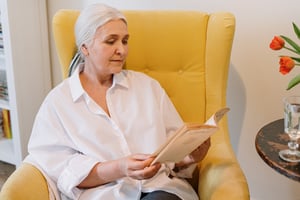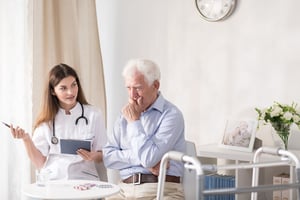As we approach 2021, we are presented with an excellent opportunity to reflect on the things we...
Winter is Coming: Combatting Seasonal Affective Disorder (SAD)
This year has been one for the books, and the COVID-19 pandemic has a considerable effect on our holidays and how we spend them. Unlike past years, many older adults will not be able to spend the holidays with their loved ones, and this may be affecting your mood. So, is this gloomy mood due to this crazy year, or could it be something more?
Seasonal Affective Disorder (SAD) is a form of depression that comes in cycles with the seasons. You may notice that you begin to feel less motivated, have a suppressed appetite, and don't engage with the things and people you love as much as you used to. As the days get colder and shorter, your circadian rhythms, or your internal clock telling you when to wake up and go to bed, get out of balance. In turn, this can affect your hormone regulation, which leads to the feelings associated with depression.
People who live farther away from the equator, and those with anxiety or bipolar disorder are more likely to be affected by Seasonal Affective Disorder than other individuals. If you have been feeling depressed and it has lasted for more than a few weeks, you may want to try taking some steps to combat this and speak to your doctor about additional options to help you feel better this winter season.
Review the following six tips to help combat Seasonal Affective Disorder this winter season:
-
Vitamin D
Although the causes for SAD have been hard for scientists to pin down, it has been linked to low levels of Vitamin D. Older adults are less efficient at producing and absorbing Vitamin D than they were in their youth, increasing the likelihood of a deficiency. With the sun sitting lower in the sky and shorter days, it is more difficult to receive Vitamin D. As a result, it may be necessary for many older adults to supplement their diets.
Some foods high in Vitamin D include:-
Fish (Salmon, Tuna, and Sardines)
-
Milk fortified with Vitamin D
-
Egg Yolks
-
Mushrooms
-
-
Exercise
 This is one of the most effective ways to combat any form of depression or anxiety. When you exercise, your body produces endorphins that help make you feel good. This natural high is well-documented, and the fantastic thing is that it doesn’t take much to get positive effects. A quick walk around the neighborhood or anything that gets you moving will do the trick.
This is one of the most effective ways to combat any form of depression or anxiety. When you exercise, your body produces endorphins that help make you feel good. This natural high is well-documented, and the fantastic thing is that it doesn’t take much to get positive effects. A quick walk around the neighborhood or anything that gets you moving will do the trick.
Is exercising a challenge for you? Check out our recent blog, "Don't Sit Still: Exercising with Limited Mobility! -
Get Outside
Try to spend time outside every day. Going for a walk is a great way to get some sunlight and keep your body moving. Both of these will help signal to your body that it is time to be awake and help regulate your hormone production. If you aren’t feeling up for a walk, find a nice spot in the sun and call a loved one or enjoy a cup of coffee.
Click here to learn more about the importance of spending time outdoors! -
Unwind
 On the flip side, you may find that it is hard for you to fall asleep at night. Try to give yourself some quiet time, read a book, take a bath, or have a glass of wine to give your mind and body some time to unwind at the end of the day. Set aside an hour each night before you plan to go to bed so that you can relax. Avoid screens, food, and water during this last hour to help you fall asleep and prevent you from waking up in the middle of the night after you have finally managed to get to bed.
On the flip side, you may find that it is hard for you to fall asleep at night. Try to give yourself some quiet time, read a book, take a bath, or have a glass of wine to give your mind and body some time to unwind at the end of the day. Set aside an hour each night before you plan to go to bed so that you can relax. Avoid screens, food, and water during this last hour to help you fall asleep and prevent you from waking up in the middle of the night after you have finally managed to get to bed. -
Light Therapy
When our circadian rhythm gets interrupted, our bodies don’t know when to produce the hormones we need to wake up and the hormones we need to sleep. Sometimes, those get mixed up, and we are left feeling tired and lazy in the middle of the day. To help your body get back on track, some people have found that light therapy has been effective. This involves sitting in front of a specially designed lightbox that filters out the harmful UV rays for about 20-30 minutes after you wake up. It is thought that with regular use, it can help get your body back on track. Before beginning a light therapy treatment, make sure you consult your doctor, as it can aggravate some conditions such as bipolar disorder.
-
Traditional Methods
 Sometimes, our bodies need a little extra help, and a trip to the doctor can be all you need to start feeling better. For some people, SAD is a yearly experience, and they start antidepressants each year before they begin to feel the symptoms. If you have been struggling with feeling depressed, don’t wait to talk to your doctor. Getting on the right form of medication may be all you need to start feeling like yourself again.
Sometimes, our bodies need a little extra help, and a trip to the doctor can be all you need to start feeling better. For some people, SAD is a yearly experience, and they start antidepressants each year before they begin to feel the symptoms. If you have been struggling with feeling depressed, don’t wait to talk to your doctor. Getting on the right form of medication may be all you need to start feeling like yourself again.






